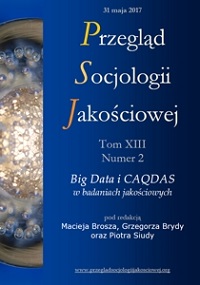Can a Computer Recognize Hate Speech? Machine Learning (ML) in Qualitative Data Analysis
DOI:
https://doi.org/10.18778/1733-8069.13.2.04Keywords:
machine learning, qualitative data analysis, hate speech, intercoder agreementAbstract
The purpose of this article is to present the process of automatic tagging of hate speech in social media. The implementation of this process allows for quantitative treatment of qualitative methods: analysis on the corpora of hundreds thousands of texts based on their meaning. The process is possible through algorithms of machine learning (ML). The example of the hate speech designation project in texts from Polish online forums is presented. The key issue is the precise of conceptualization and operationalization of category “hate speech.” This allows for preparing specific instructions and conducting the training code unit. As a result we get higher rates of inter-coder agreement. Marked texts will be used as training data for automated categorization methods based on ML algorithms. Then we describe the course of machine coding. This article also seeks to establish problems associated with automatic coding of hate speech and propose solutions. In summary, we point the factors that are crucial to the research process that uses machine learning.
Downloads
References
Bishop Christopher (2006) Pattern Recognition and Machine Learning. Secaucus: Springer-Verlag.
Google Scholar
Breiman Leon (2001) Random Forests. „Machine Learning”, vol. 45, no. 1, s. 5‒32.
Google Scholar
DOI: https://doi.org/10.1023/A:1010933404324
Bychawska-Siniarska Dominika, Głowacka Dorota, red., (2013) Mowa nienawiści w internecie: jak z nią walczyć. Warszawa: Helsińska Fundacja Praw Człowieka.
Google Scholar
Bychawska-Siniarska Dominika, Gliszczyńska-Grabias Aleksandra (2016) W stronę sieci tolerancji. Prawnomiędzynarodowe instrumenty walki z mową nienawiści [dostęp 14 maja 2017 r.]. Dostępny w Internecie http://www.siectolerancji.pl/aktualnosc/w-strone-sieci-tolerancji-publikacja-w-module-prawnym
Google Scholar
Cortes Corinna, Vapnik Vladimir (1995) Support-Vector Networks. „Machine Learning”, vol. 20, no. 3, s. 273–297.
Google Scholar
DOI: https://doi.org/10.1007/BF00994018
Gutierrez Dario i in. (2016) Literal and Metaphorical Senses in Compositional Distributional Semantic Models. Proceedings of the 54th Annual Meeting of the Association for Computational Linguistics, (ACL) 2016, August 7-12, 2016, Berlin, Germany, vol. 1 [dostęp 14 maja 2017 r.]. Dostępny w Internecie http://aclweb.org/anthology/P/P16/P16-1018.pdf
Google Scholar
DOI: https://doi.org/10.18653/v1/P16-1018
Heinze Eric (2016) Hate Speech and Democratic Citizenship. Oxford: Oxford University Press.
Google Scholar
DOI: https://doi.org/10.1093/acprof:oso/9780198759027.001.0001
Jockers Matthew (2013) Macroanalysis: Digital Methods and Literary History. Champaign: University of Illinois Press.
Google Scholar
DOI: https://doi.org/10.5406/illinois/9780252037528.001.0001
Krejtz Izabela, Krejtz Krzysztof (2005) Wybrane statystyki zgodności między sędziami w analizie treści [w:] Katarzyna Stemplewska-Żakowicz, Krzysztof Krejtz, red., Wywiad psychologiczny. Wywiad jako postępowanie badawcze. Warszawa: Pracownia Testów Psychologicznych Polskiego Towarzystwa Psychologicznego, s. 231–249.
Google Scholar
Krippendorff Klaus (1980) Content Analysis: An Introduction to Its Methodology. Newbury Park, CA: Sage.
Google Scholar
Lafferty John D., McCallum Andrew, Pereira Fernando C. N. (2001) Conditional Random Fields: Probabilistic Models for Segmenting and Labeling Sequence Data. Proceedings of the Eighteenth International Conference on Machine Learning (ICML ‘01), San Francisco, USA, Morgan Kaufmann Publishers Inc., s. 282–289.
Google Scholar
Lample Guillaume i in. (2016) Neural Architectures for Named Entity Recognition. Proceedings of the Conference of the North American Chapter of the Association for Computational Linguistics. The Association for Computational Linguistics, s. 260–270.
Google Scholar
DOI: https://doi.org/10.18653/v1/N16-1030
Linde-Usiekniewicz Jadwiga (2015) Teoria relewancji jako narzędzie opisu mowy nienawiści. „Studia Pragmalingwistyczne”, t. 7, s. 53–68.
Google Scholar
Lombard Matthew, Snyder-Duch Jennifer, Bracken Cheryl Campanella (2004) A Call for Standardization in Content Analysis Reliability. „Human Communication Research”, vol. 30, s. 434–437.
Google Scholar
DOI: https://doi.org/10.1111/j.1468-2958.2004.tb00739.x
Łodziński Sławomir (2003) Problemy dyskryminacji osób należących do mniejszości narodowych i etnicznych w Polsce. Warszawa: Kancelaria Sejmu, Biuro Studiów i Ekspertyz.
Google Scholar
Manning Christopher D. i in. (2014) The Stanford CoreNLP Natural Language Processing Toolkit. Proceedings of the 52nd Annual Meeting of the Association for Computational Linguistics. The Association for Computational Linguistics. ACL, System Demonstrations.
Google Scholar
DOI: https://doi.org/10.3115/v1/P14-5010
Moretti Franco (2013) Distant Reading. London: Verso Books.
Google Scholar
Nijakowski Lech (2008) Mowa nienawiści w świetle teorii dyskursu [w:] Anna Horolets, red., Analiza dyskursu w socjologii i dla socjologii. Warszawa: Wydawnictwo Adam Marszałek, s. 113–133.
Google Scholar
Ogrodniczuk Maciej, Lenart Michał (2013) A Multi-Purpose Online Toolset for NLP Applications. Proceedings of the 18th International Conference on Applications of Natural Language to Information Systems, vol. 7934 of Lecture Notes in Computer Science, Springer-Verlag. Springer Berlin Heidelberg, s. 392–395.
Google Scholar
DOI: https://doi.org/10.1007/978-3-642-38824-8_46
Pedregosa Fabian i in. (2011) Scikit-Learn: Machine Learning in Python. „Journal of Machine Learning Research”, vol. 12, s. 2825–2830.
Google Scholar
Siwicki Maciej (2011) Nielegalna i szkodliwa treść w Internecie. Aspekty prawnokarne. Warszawa: Oficyna Wolters Kluwer.
Google Scholar
Sperber Dan, Wilson Deidre (2011) Relewancja. Komunikacja i poznanie. Przełożyły Magdalena Charzyńska i n.. Kraków: Wydawnictwo Tertium.
Google Scholar
Stone Philip J. i in. (1966) The General Inquirer: A Computer Approach to Content Analysis. Cambridge: MIT Press.
Google Scholar
Troszyński Marek (2015) Hate Speech. Towards a Research Standard [w:] Jacek Sobczak, Jędrzej Skrzypczak, red., Professionalism in Journalism in the Era of New Media. Berlin: Logos, s. 199–208.
Google Scholar
Wawer Aleksander, Rogozińska Dominika (2012) How much supervision? Corpus-based lexeme sentiment estimation. IEEE 12th International Conference on Data Mining Workshops (SENTIRE 2012), Los Alamitos, USA, IEEE Computer Society, s. 724–730.
Google Scholar
DOI: https://doi.org/10.1109/ICDMW.2012.119
Wieruszewski Roman i in., red., (2010) Mowa nienawiści a wolność słowa. Aspekty prawne i społeczne. Warszawa: Wolters Kluwer.
Google Scholar
Downloads
Published
How to Cite
Issue
Section
License

This work is licensed under a Creative Commons Attribution-NonCommercial-NoDerivatives 4.0 International License.














